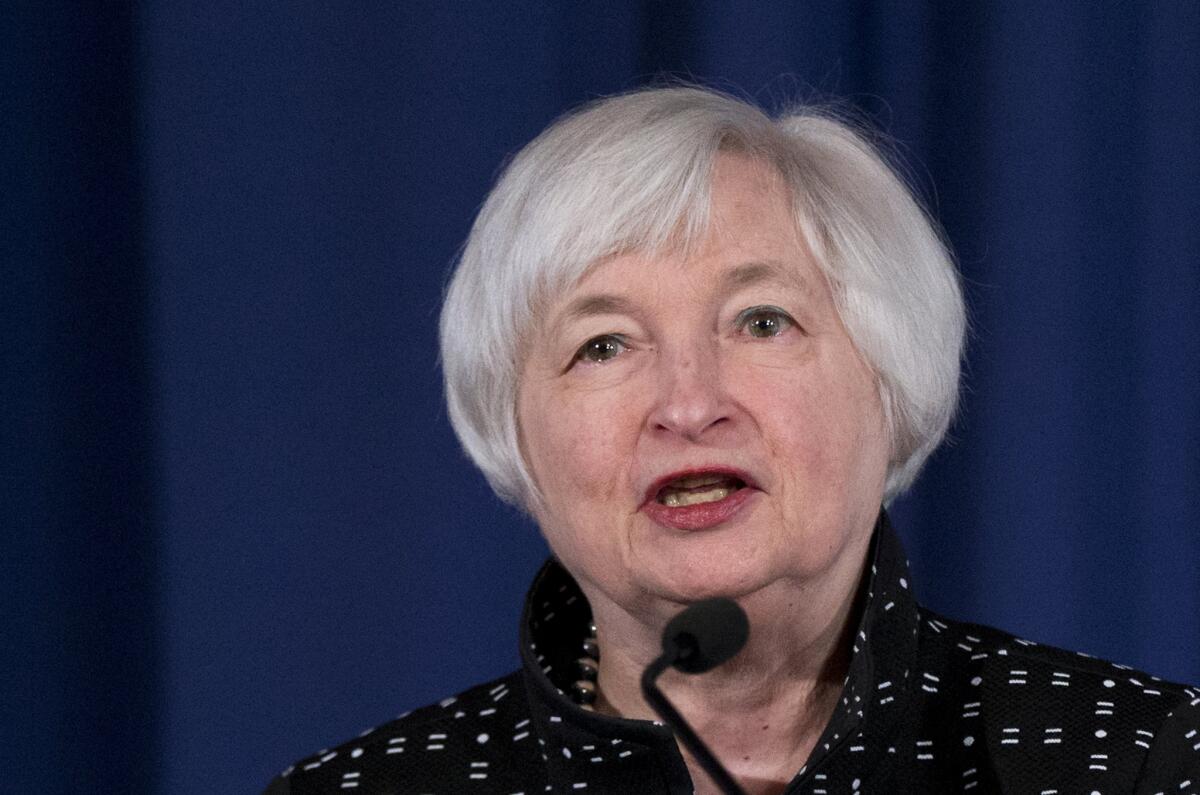Fed policymakers edge closer to December rate hike, minutes show

Federal Reserve Chairwoman Janet L. Yellen speaks during a news conference on “Monetary Policy Implementation and Transmission in the Post-Crisis Period” on Thursday.
- Share via
Most Federal Reserve policymakers believe next month could be the right time to nudge up a key interest rate for the first time in nearly a decade, according to minutes of their last meeting.
Most members of the policymaking Federal Open Market Committee said at the late October gathering that they anticipated the conditions for raising the rate “could well be met by the time of the next meeting,” according to the minutes, released Wednesday. The committee next meets Dec. 15-16.
“Everything’s flashing go at the moment, and they seem to be acknowledging that,” said Chris Rupkey, chief financial economist at Union Bank in New York. “They’ve been inching closer and closer and closer over the past several months. I think they’re running out of room.”
Fed policymakers said they decided to signal after the October meeting that they could raise the so-called federal funds rate in December because economic risks from abroad had eased. But the officials opted to wait on a hike because of worries about data at the time indicating a slowing job market and low inflation.
With economic reports released following the meeting showing surprisingly strong labor market growth and increasing inflation, the case for a December rate hike is even stronger now.
Still, Fed policymakers expressed concern last month about “unanticipated shocks” to the economy, so it’s possible that severe economic fallout from the Paris terrorist attacks could change their views.
But Rupkey said that was unlikely.
“About the only thing would be if the U.S. were to send in ground troops into Syria,” he said. “It would have to be something very major, something that altered the optimism on the part of consumers and made them think the economy was in desperate, not just dire, straits.”
Ian Shepherdson, chief economist at Pantheon Macroeconomics, said that despite several caveats in the minutes, a December rate hike is “the most likely bet.”
Investors reacted positively Wednesday to the Fed minutes, which showed the uncertainty about interest rates might be ending soon. The Dow Jones industrial average jumped nearly 150 points after the minutes were released, ending the day up 247.66 points, or 1.4%, to close at 17,737.16.
Fed Chairwoman Janet L. Yellen told Congress on Nov. 4 that a rate hike could come in December, but that no decision had been made.
Fed officials voted 9 to 1 in October to hold the rate near zero, where it has been since late 2008 in an effort to stimulate economic growth. The Fed began lowering the rate in 2006 as economic conditions worsened ahead of the Great Recession.
Some of the meeting participants said they thought the conditions had already been reached in October. Jeffrey Lacker, president of the Federal Reserve Bank of Richmond, Va., dissented from the rate vote for that reason.
But other participants said it was unlikely that economic data received by the December meeting would warrant a rate increase, raising the prospect of several dissents if the Fed decides to take action then. Fed leaders prefer to have consensus on major decisions, such as rate hikes or cuts.
All Fed officials “generally agreed” that the rate should rise gradually to avoid damaging the still-recovering economy. That probably means just a 0.25-percentage-point increase for the first hike and possibly a similar hike in a month or more.
Many analysts had thought the Fed was set to raise the rate in September. But beginning in late August, global financial market turmoil triggered by concern about the slowing Chinese economy led central bank officials to wait.
By the October meeting, most Fed policymakers “saw the downside risks arising from economic and financial developments abroad as having diminished,” the minutes said.
After the Fed staff cautioned that investors saw the chances of a rate hike this year decreasing, the committee decided to take the unusual step of signaling in its post-meeting statement that it could raise the rate in December.
Members stressed that a decision would depend on continued positive economic data, “provided that unanticipated shocks do not adversely affect the economic outlook.”
Still, a few policymakers said they were concerned the statement “could be misinterpreted as signaling too strongly” that the rate would be increased in December, the minutes said.
On Wednesday, Robert S. Kaplan, president of the Federal Reserve Bank of Dallas, said in a speech that policymakers have been “prudent in waiting for more data” before raising the rate. But he said there were costs to the economy of keeping the rate near zero for too long.
Speaking at an investor conference in New York, Dennis Lockhart, president of the Federal Reserve Bank of Atlanta, said he was comfortable with raising the rate soon.
More to Read
Inside the business of entertainment
The Wide Shot brings you news, analysis and insights on everything from streaming wars to production — and what it all means for the future.
You may occasionally receive promotional content from the Los Angeles Times.











